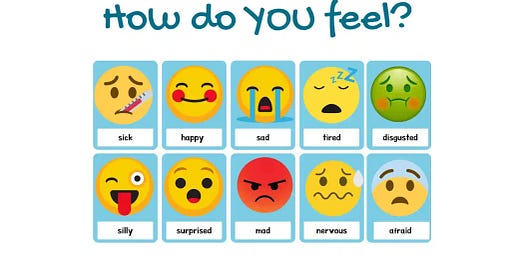The point I make in this post is quite unlikely to be original. But I can’t be bothered to search more for prior sources.
Children spend a lot of time crying. And also in enthusiastic joy. For these and other cases, adults teach kids to regulate their emotions. To control your emotions more than they control you. Most strong emotional displays are seen as immature, and show the displayer to be weak.
Adults thus learn to be wary of strong emotional expressions, especially poorly controlled ones. When we express emotions, it is important that we are seen to be regulating them, expressing only the types and levels appropriate to the context.
But this leaves us with a lot of emotions that we feel more strongly than we express. We fill this deficit in part by expressing more emotions in private than in public. And by treasuring our most intimate relations, where we can sometimes let our emotions overwhelm us. But that is still not enough.
I suspect that filling this gap is one of the main social functions of music (and stories). In a song, the singer expresses an emotion in a way that makes it especially easy for us to see what they feel, and to join them in expressing a similar feeling via listening or singing along. But song expressions are safer than typical human expressions of emotions in many ways.
For example, our emotional reaction to a song is muted by it not being directly about our personal life; we are officially sympathizing with someone elses’ situation, not our own. Once we’ve heard a song once, its predictability ensures that our emotions stay within predictable and acceptable bounds. Knowing that others enjoy the same song gives social proof that its emotions are acceptable. And most important, songwriters pick cases of relatively respectable emotions, that don’t much suggest immaturity or weakness.
Teens are the adults most in need of acceptable outlets for strong emotions, and they are the biggest fans of music. Teens are also the people most into “cool”, i.e. showing exaggeratedly strong control over emotions. And so teens naturally prefer “cool” songs, wherein singers seem fully committed to their strength-showing emotions, and are not hesitant or embarrassed about those emotions.
This social function of songs makes them especially potent as a means of cultural transmission. Songs show us what emotions are acceptable or desirable, and in what situations. Cultures have often shown their disapproval of particular emotions via disapproving of related music. And thus cultural activists have often craved influence over changes to songs, as that often has outsized influence over perceived appropriate emotion-situation mappings.















I try to stay up on evolutionary psychology, and read various books about the evolutionary functions of music 10-15 years ago when a few of those come out. Your idea seems to be a novel (and good) account. I annually attend HBES, etc.
As usual, Plato was the first to point out the power of music to change culture - and everything else. Quote from The Republic, Book IV:
The regulations which we are prescribing, my good Adeimantus, are not, as might be supposed, a number of great principles, but trifles all, if care be taken, as the saying is, of the one great thing,—a thing, however, which I would rather call, not great, but sufficient for our purpose.
What may that be? he asked.
Education, I said, and nurture: If our citizens are well educated, and grow into sensible men, they will easily see their way through all these, as well as other matters which I omit; such, for example, as marriage, the possession of women and the procreation of children, which will all follow the general principle that friends have all things in common, as the proverb says.
That will be the best way of settling them.
Also, I said, the State, if once started well, moves with accumulating force like a wheel. For good nurture and education implant good constitutions, and these good constitutions taking root in a good education improve more and more, and this improvement affects the breed in man as in other animals.
Very possibly, he said.
Then to sum up: This is the point to which, above all, the attention of our rulers should be directed,—that music and gymnastic be preserved in their original form, and no innovation made. They must do their utmost to maintain them intact. And when any one says that mankind most regard:
‘The newest song which the singers have,’
...they will be afraid that he may be praising, not new songs, but a new kind of song; and this ought not to be praised, or conceived to be the meaning of the poet; for any musical innovation is full of danger to the whole State, and ought to be prohibited. So Damon tells me, and I can quite believe him;—he says that when modes of music change, the fundamental laws of the State always change with them.